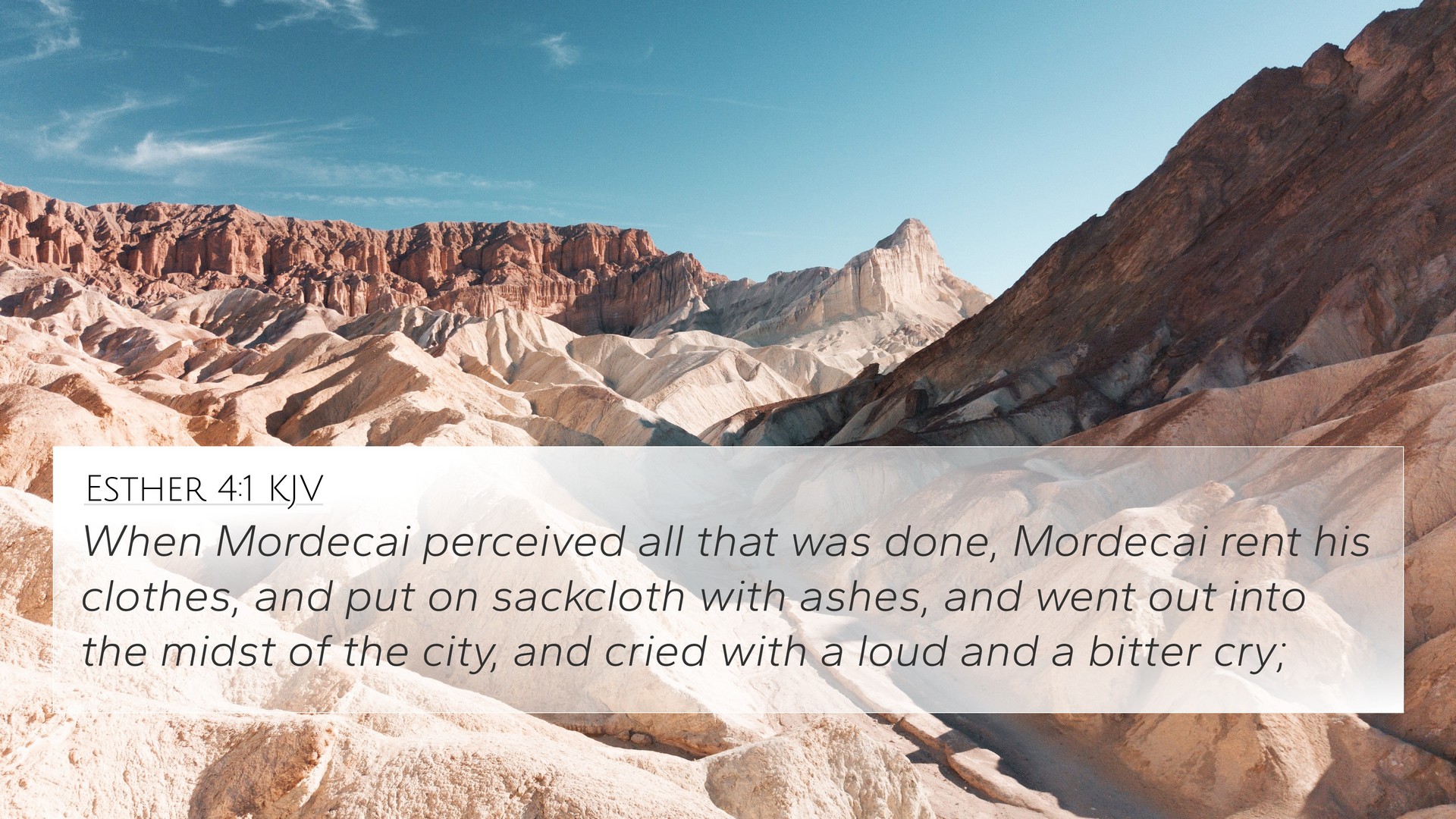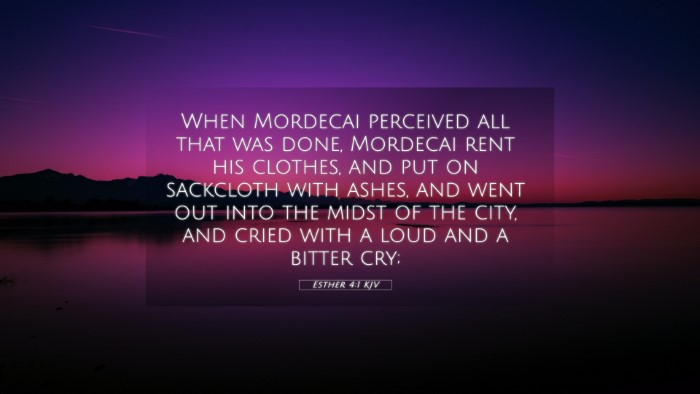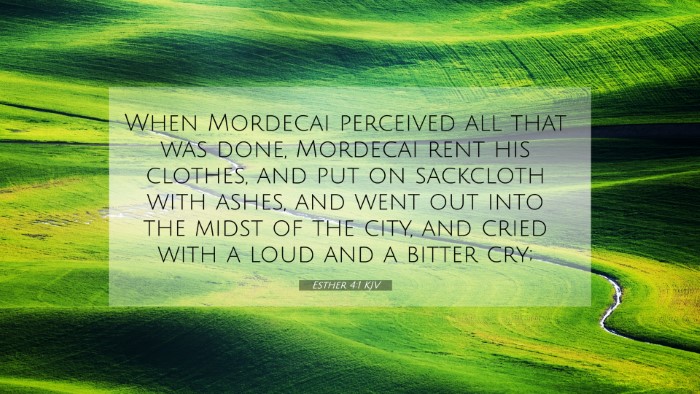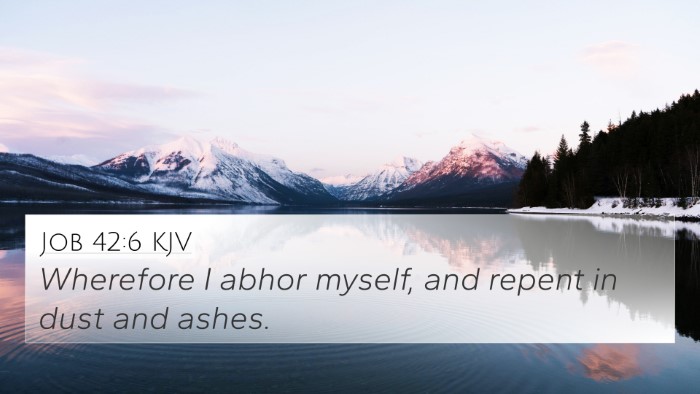Old Testament
Genesis Exodus Leviticus Numbers Deuteronomy Joshua Judges Ruth 1 Samuel 2 Samuel 1 Kings 2 Kings 1 Chronicles 2 Chronicles Ezra Nehemiah Esther Job Psalms Proverbs Ecclesiastes Song of Solomon Isaiah Jeremiah Lamentations Ezekiel Daniel Hosea Joel Amos Obadiah Jonah Micah Nahum Habakkuk Zephaniah Haggai Zechariah MalachiEsther 4:1 Similar Verses
Esther 4:1 Cross References
When Mordecai perceived all that was done, Mordecai rent his clothes, and put on sackcloth with ashes, and went out into the midst of the city, and cried with a loud and a bitter cry;
Uncover the Rich Themes and Topics of This Bible Verse
Listed below are the Bible themes associated with Esther 4:1. We invite you to explore each theme to gain deeper insights into the Scriptures.
Esther 4:1 Cross Reference Verses
This section features a detailed cross-reference designed to enrich your understanding of the Scriptures. Below, you will find carefully selected verses that echo the themes and teachings related to Esther 4:1 KJV. Click on any image to explore detailed analyses of related Bible verses and uncover deeper theological insights.
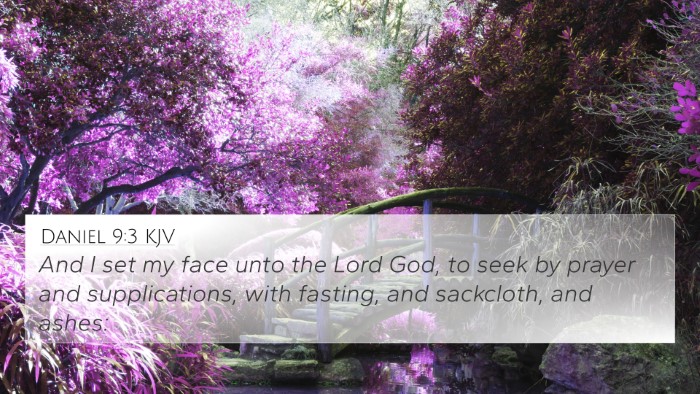
Daniel 9:3 (KJV) »
And I set my face unto the Lord God, to seek by prayer and supplications, with fasting, and sackcloth, and ashes:
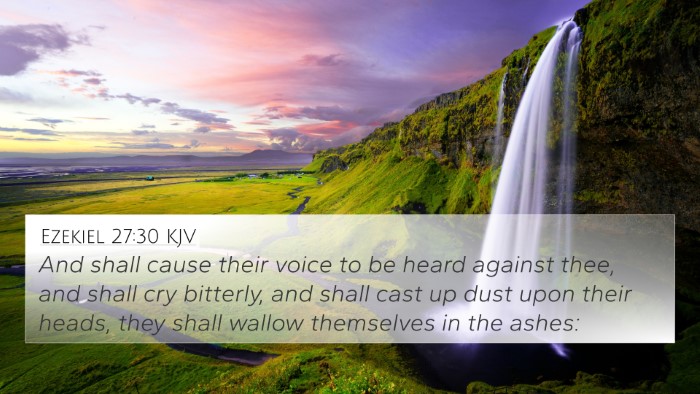
Ezekiel 27:30 (KJV) »
And shall cause their voice to be heard against thee, and shall cry bitterly, and shall cast up dust upon their heads, they shall wallow themselves in the ashes:
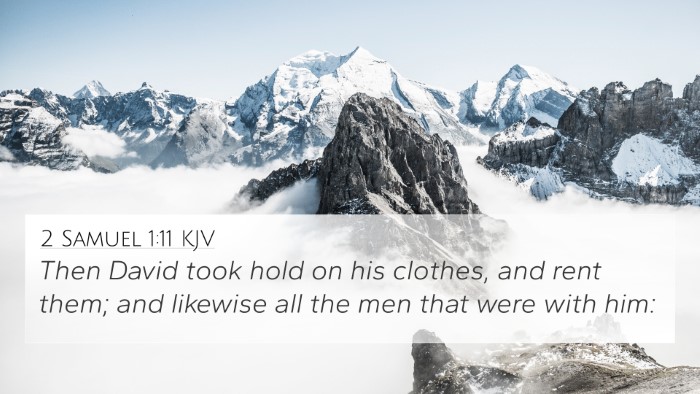
2 Samuel 1:11 (KJV) »
Then David took hold on his clothes, and rent them; and likewise all the men that were with him:
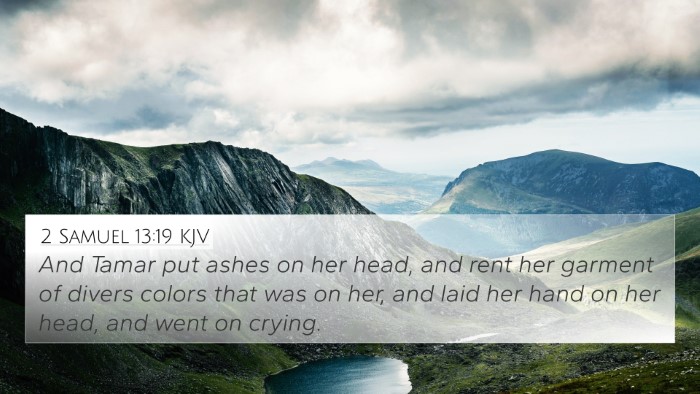
2 Samuel 13:19 (KJV) »
And Tamar put ashes on her head, and rent her garment of divers colors that was on her, and laid her hand on her head, and went on crying.

Revelation 18:17 (KJV) »
For in one hour so great riches is come to nought. And every shipmaster, and all the company in ships, and sailors, and as many as trade by sea, stood afar off,
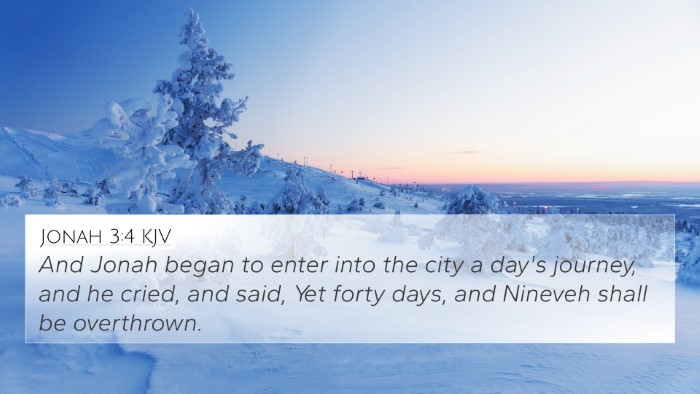
Jonah 3:4 (KJV) »
And Jonah began to enter into the city a day's journey, and he cried, and said, Yet forty days, and Nineveh shall be overthrown.

Micah 1:8 (KJV) »
Therefore I will wail and howl, I will go stripped and naked: I will make a wailing like the dragons, and mourning as the owls.
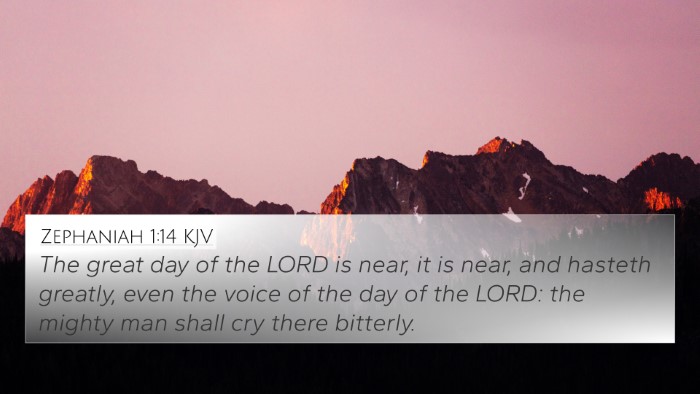
Zephaniah 1:14 (KJV) »
The great day of the LORD is near, it is near, and hasteth greatly, even the voice of the day of the LORD: the mighty man shall cry there bitterly.
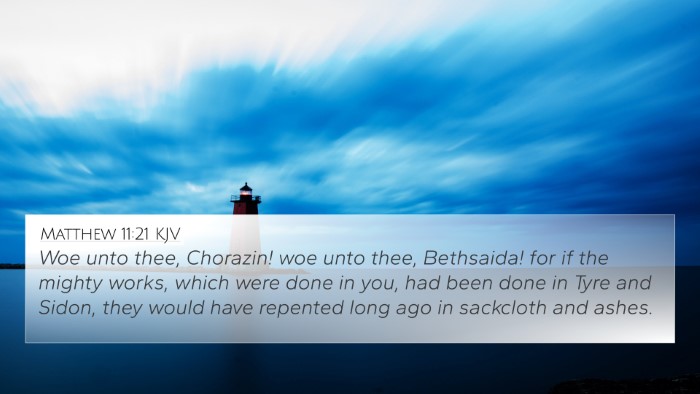
Matthew 11:21 (KJV) »
Woe unto thee, Chorazin! woe unto thee, Bethsaida! for if the mighty works, which were done in you, had been done in Tyre and Sidon, they would have repented long ago in sackcloth and ashes.

Acts 14:14 (KJV) »
Which when the apostles, Barnabas and Paul, heard of, they rent their clothes, and ran in among the people, crying out,
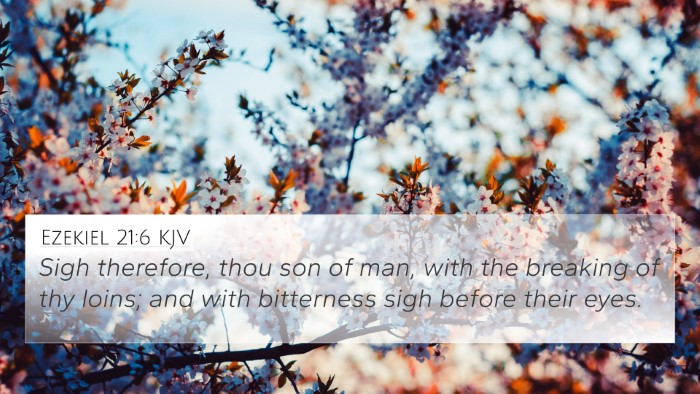
Ezekiel 21:6 (KJV) »
Sigh therefore, thou son of man, with the breaking of thy loins; and with bitterness sigh before their eyes.
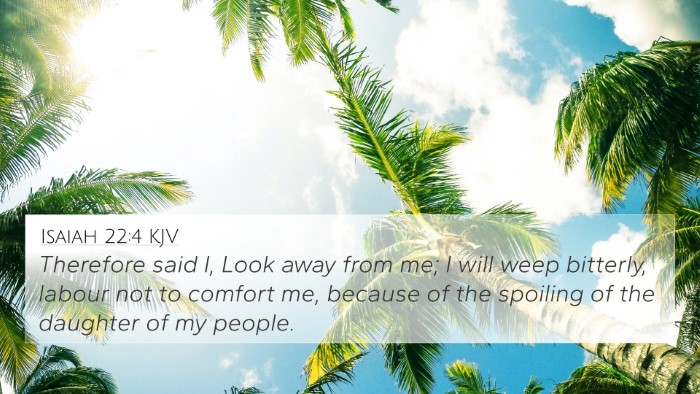
Isaiah 22:4 (KJV) »
Therefore said I, Look away from me; I will weep bitterly, labour not to comfort me, because of the spoiling of the daughter of my people.
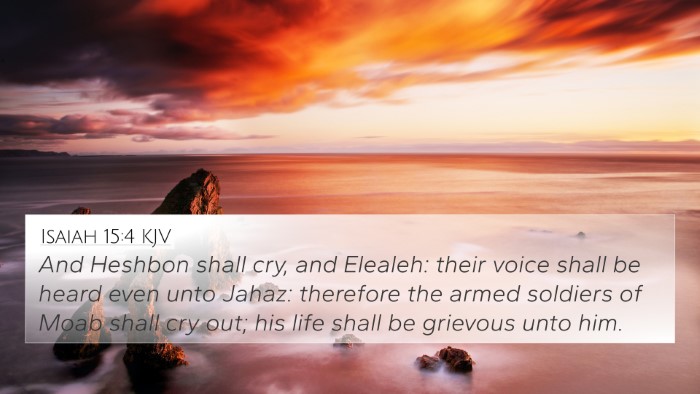
Isaiah 15:4 (KJV) »
And Heshbon shall cry, and Elealeh: their voice shall be heard even unto Jahaz: therefore the armed soldiers of Moab shall cry out; his life shall be grievous unto him.
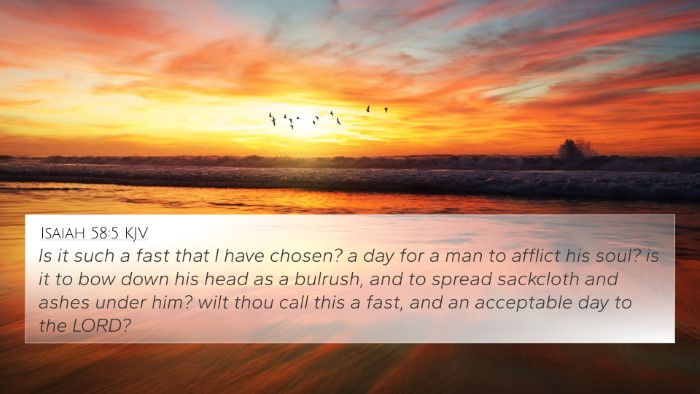
Isaiah 58:5 (KJV) »
Is it such a fast that I have chosen? a day for a man to afflict his soul? is it to bow down his head as a bulrush, and to spread sackcloth and ashes under him? wilt thou call this a fast, and an acceptable day to the LORD?
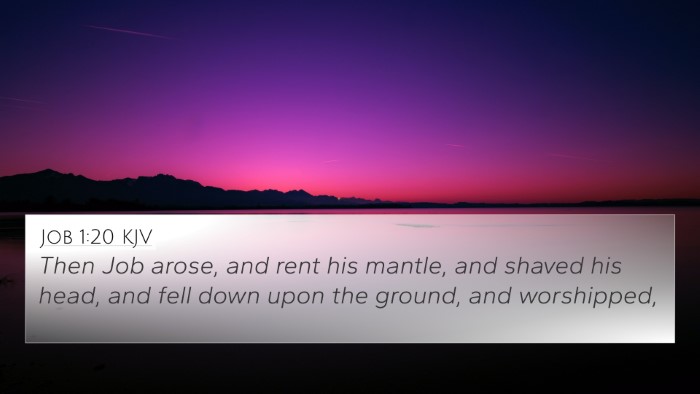
Job 1:20 (KJV) »
Then Job arose, and rent his mantle, and shaved his head, and fell down upon the ground, and worshipped,
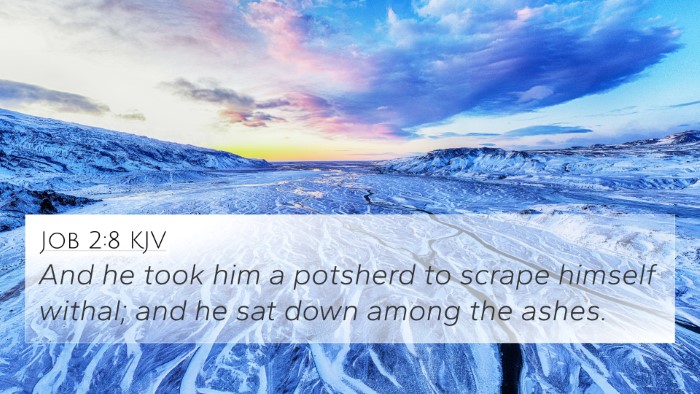
Job 2:8 (KJV) »
And he took him a potsherd to scrape himself withal; and he sat down among the ashes.
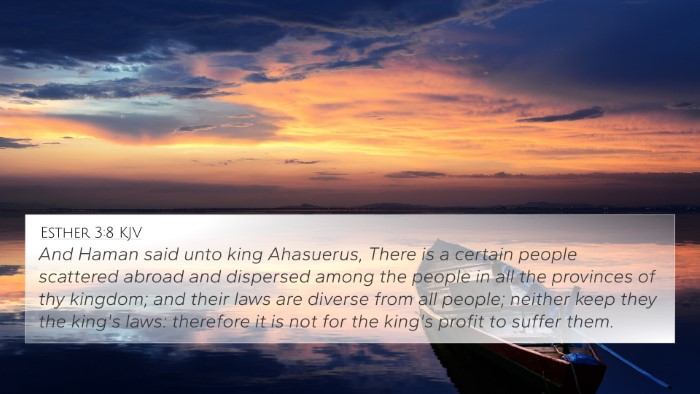
Esther 3:8 (KJV) »
And Haman said unto king Ahasuerus, There is a certain people scattered abroad and dispersed among the people in all the provinces of thy kingdom; and their laws are diverse from all people; neither keep they the king's laws: therefore it is not for the king's profit to suffer them.
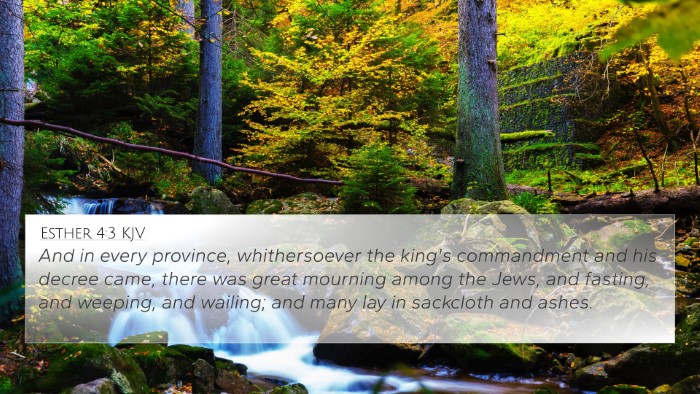
Esther 4:3 (KJV) »
And in every province, whithersoever the king's commandment and his decree came, there was great mourning among the Jews, and fasting, and weeping, and wailing; and many lay in sackcloth and ashes.
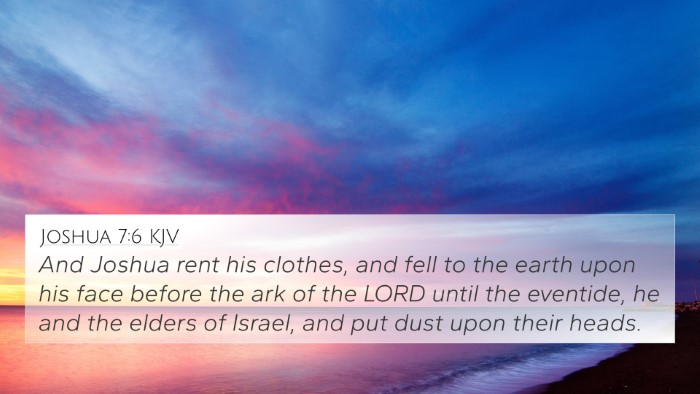
Joshua 7:6 (KJV) »
And Joshua rent his clothes, and fell to the earth upon his face before the ark of the LORD until the eventide, he and the elders of Israel, and put dust upon their heads.
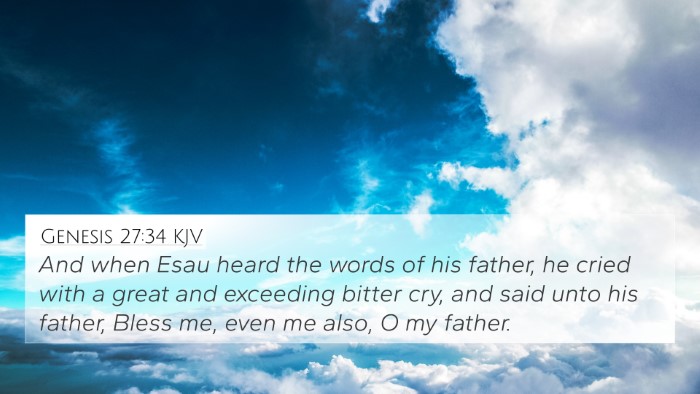
Genesis 27:34 (KJV) »
And when Esau heard the words of his father, he cried with a great and exceeding bitter cry, and said unto his father, Bless me, even me also, O my father.
Esther 4:1 Verse Analysis and Similar Verses
Understanding Esther 4:1
Esther 4:1 narrates a poignant moment in the Book of Esther, where Mordecai learns of the decree to annihilate the Jews and responds with great distress. This verse emphasizes the emotional turmoil and urgency faced by Mordecai, as well as the broader implications for the Jewish people during this critical time.
Verse Analysis
The verse states:
"When Mordecai perceived all that was done, Mordecai rent his clothes, and put on sackcloth with ashes, and went out into the midst of the city, and cried with a loud and bitter cry."
Contextual Insights
According to Matthew Henry, this act of mourning by Mordecai is not merely a personal lament; it signifies the collective despair of the Jewish people. Mordecai's actions are a call to action and unity among his people in response to impending doom. His use of sackcloth and ashes is a traditional expression of grief and repentance, symbolizing a deep plea for divine intervention.
Albert Barnes notes that Mordecai's public display of mourning serves to rally the Jewish community. His loud cry in the city reflects the urgency of the situation and the need for immediate awareness and response to the crisis facing the Jews in Persia.
Adam Clarke interprets the verse as a moment that sets the stage for Esther's eventual involvement and leadership. Mordecai’s distress is not only about personal loss but also represents a profound concern for the fate of his people. This moment accentuates the themes of courage and intercession that run through the narrative.
Thematic Bible Verse Connections
Esther 4:1 ties into several thematic elements found throughout scripture. Here are significant cross-references that exemplify its themes of despair, intercession, and divine providence:
- Job 1:20: Job's lamentation after losing his children resonates with the theme of distress.
- Psalms 30:5: This verse reflects on the temporary nature of sorrow, paralleling Mordecai's immediate grief.
- Jeremiah 9:1: Jeremiah's weeping for his people connects with Mordecai's sorrow for the Jews.
- Nehemiah 1:4: Nehemiah's mourning for Jerusalem correlates with Mordecai's grief for the Jewish people.
- Luke 18:1-8: The parable of the persistent widow reflects the need for intercession and earnest prayer.
- Romans 12:15: This exhortation to weep with those who weep connects with the communal aspect of mourning present in Esther.
- Philippians 4:6-7: The call to prayer and supplication is key in moments of anguish like that faced by Mordecai.
- James 5:16: The power of prayer as a communal act in times of distress echoes the urgent need demonstrated by Mordecai.
- 1 Timothy 2:1: Paul’s instruction to pray for all people reflects the broader call to intercession similar to Mordecai's actions.
- Ephesians 6:18: Encouragement to pray in the Spirit highlights the need for vigilance and support in times of crisis.
Conclusion
Esther 4:1 serves as a powerful reminder of the importance of community mourning, intercession, and the call to action in the face of impending peril. The emotional responses depicted through the actions of Mordecai stress the interconnected nature of faith, prayer, and collective resilience. Understanding this verse not only enriches our insights into the Book of Esther but also enhances our recognition of the themes prevalent throughout the Bible, illustrating how scriptural texts dialogue and connect with one another.
